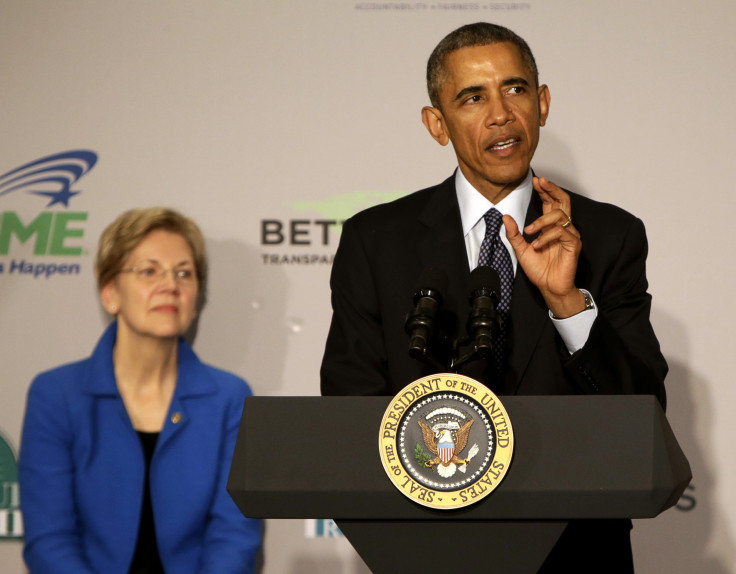Wall Street Fires Back At Obama Over Broker Standards

Most retirement account-holders have little idea whether the person who manages their nest egg is a “fiduciary” or not. But knowing the difference could save the median two-earner family up to $155,000 over a lifetime of investing, according to a 2012 study from Demos, a New York-based public policy group. The subtle distinction has reignited a long battle between Wall Street and reform advocates over how to ensure investment advice works for everyone.
The Department of Labor, backed by the rest of the Obama administration, has renewed its push to hold retirement advisers to tougher standards, seeking to require more brokers to act in the best interest of their clients. That effort has in turn spurred another bout of vigorous lobbying by Wall Street interests, keen on preserving the status quo.
Groups opposing the standards include the industry’s heavy-hitters like the Securities Industry and Financial Markets Association, or Sifma, and the Financial Services Roundtable. The two groups combined have spent more than $60 million lobbying over financial reforms in the past five years. The Financial Services Institute, which focuses primarily on investment advisers, has more than quadrupled its lobbying expenditures since 2010.
“There is just a tidal wave of opposition,” says Lisa Donner of Americans for Financial Reform, a consumer group that supports the proposed rules. “This has been a very long time coming.”
At issue is the so-called fiduciary rule, a legal standard that says advisers must act in the best interest of their clients. Fiduciaries must seek out investments with the lowest fees and best returns. Pension fund custodians and similar retirement fund managers already are required to act according to this standard.
But many of those who dispense retirement advice are not obligated to act in their clients’ best interests. Their counsel merely must be “suitable” for clients, a looser standard. Savers looking to reinvest their 401(k)s in individual retirement accounts might be unaware that their brokers have other incentives in mind: namely, commissions on the sale of investment products, the most lucrative of which come loaded with obscure fees.
Such conflicts of interest were the focus of a report released last month by the White House’s Council of Economic Advisers, which argued that $17 billion a year in fees flow out of retirement savings accounts due to bad advice.
“There are financial advisers who receive back-door payments or hidden fees for steering people into bad retirement investments,” said President Barack Obama, announcing his support of the rules. “They might even recommend investments with worse returns simply because they get paid to recommend those products.”
On Monday, Sifma fired back with a white paper that took aim at the White House report, specifically its headline $17 billion figure, which authors derived from multiple academic sources but appears nowhere in scholarship.
The Sifma-commissioned report charges the authors “make generalizations and extrapolations” in reaching that number. On a conference call with reporters Monday, Sifma chief executive Kenneth Bentsen expressed concern that the White House paper “draws questionable -- at best -- conclusions from the cited academic research.”
But Jonathan Reuter, an associate professor of finance at Boston College who is cited in both the White House report and Sifma’s rebuttal, sees the $17 billion figure as reasonable. “It’s probably in the ballpark,” he says.
Reuter compared actively managed mutual funds to funds that simply followed an index -- the difference between paying 1 percent to have someone picking stocks for you and paying 0.1 percent to passively follow the S&P 500. Although lower-fee index funds generally performed better, Reuter and his co-author found, brokers were more likely to sell their clients on actively managed funds. “They’re doing something that helps themselves at your expense.”
This finding, replicated in numerous other studies, has straightforward policy implications for Reuter. “If you’re applying a fiduciary standard, your broker is going to say, ‘Look, an index fund is the better long term option for you.’” As it stands now, more brokers are sending their clients to actively managed funds with lower returns and higher commissions.
Still, Reuter cautions against applying his findings too broadly. “There are a lot of caveats,” he says. Sifma echoes the point, noting the relatively narrow focus of Reuter’s studies.
Sifma’s paper leads an offensive by Wall-Street-backed groups to stymie any attempt to apply fiduciary standards to a broader range of investment advisers. They hope to replicate their success in beating back the original 2010 Department of Labor rules. Concerted pushback from the financial services industry torpedoed the proposal in 2011, and it was perpetually delayed thereafter.
“They tried to smother it in its cradle,” Donner says of industry opposition to the rule. The three most prominent Wall-Street-backed groups now employ at least 20 lobbyists specifically to fight the new standards, according to the most recent federal disclosures.
But this latest proposal has powerful allies, including the Obama administration, the AARP, and a hodgepodge of financial reform groups. In late February, the Department of Labor sent the Office of Management and Budget its proposal, the specifics of which are still unknown. The OMB is expected to return the proposal by mid-spring.
Though Reuter has concerns about brokers’ conflicts of interests, he welcomes a public dialogue over the new rules. “How will it be implemented? We can and should have long conversations about what the fiduciary standards will mean,” he says. Given the energy both sides have mustered, there should be no shortage of conversation in coming months.
© Copyright IBTimes 2024. All rights reserved.





















